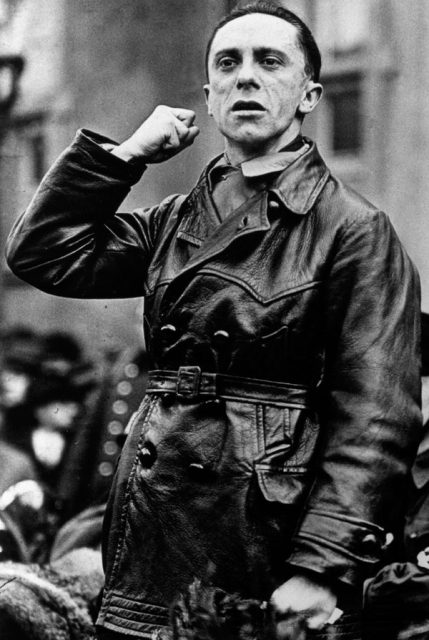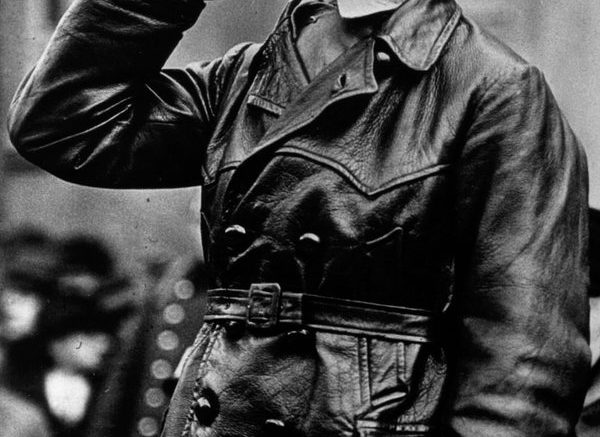
“The secret of propaganda [is to] permeate the person it aims to grasp without his even noticing that he is being permeated.”
— Joseph Goebbels, the propaganda minister for Hitler’s Nazi Party
By Karen Greenberg
TomDispatch.org (5/17/18)
Consider us officially in an Orwellian world, though we only half realize it. While we were barely looking, significant parts of an American language long familiar to us quite literally, and in a remarkably coherent way, went down the equivalent of George Orwell’s infamous Memory Hole.
This hit me in a personal way recently. I was asked to give a talk at an annual national security conference held in downtown Manhattan and aimed largely at an audience of college students. The organizer, who had pulled together a remarkable array of speakers, encountered problems in one particular area: his efforts to include representatives of the Trump administration in the gathering. Initially, administration officials he dealt with wouldn’t even divulge the names of possible participants, only their titles, leaving who was coming a mystery until days before the conference opened.
Instead of hurling insults at President Trump’s incompetence and the seeming disarray of his presidency, it might be worth taking a step back and asking ourselves whether there is indeed a larger goal in mind: namely, a slow, patient, incremental dismantling of democracy, beginning with its most precious words.
In addition, before agreeing to send speakers, his contacts at Immigration and Customs Enforcement, known by the acronym ICE, had not just requested but insisted that the word “refugee” be removed from the conference program. It was to appear in a description of a panel entitled “Refugee Programs, Immigration, Customs and Border Protection.”
The reason given: the desire to get through the administration approval process in Washington without undue delay. It’s not hard to believe that the administration that wanted to slow to a standstill refugees coming to the U.S. didn’t have an allied urge to do away with the very word itself. In order to ensure that ICE representatives would be there, the organizer reluctantly conceded and so the word “refugee” was dutifully removed from the program.
Meanwhile, the actual names of Department of Homeland Security officials coming to speak were withheld until three days before the event. Finally, administration representatives in touch with the conference organizers insisted that the remarks of any government representatives could not be taped, which meant, ultimately, that none of the proceedings could be taped. As a result, this conference was not recorded for posterity.
For me — and I’ve been observing the national security landscape for years now — this was something of a new low when it came to surrounding a previously open event in a penumbra of secrecy. It made me wonder how many other organizers across the country had been strong-armed in a similar fashion, how many words had been removed from various programs, and how much of what an American citizen should know now went unrecorded. …
*****
Police Are ‘Mislabeling’ Anti-LGBTQ And Other Crimes As Anti-Heterosexual
By Rachel Glickhouse & Rahima Nasa
ProPublica (5/15/17)
Rob heard a loud knock at his door late one night in August 2014. His landlord had been calling him about maintenance issues in his Columbus, Ohio, apartment, but that night she came with a male companion and began to scream at him. According to a police report, the man jumped into the argument and threatened Rob — who asked that we not use his full name — with a homophobic slur. Fearing an escalation, he called the police.
“A thing that I’ve dealt with my entire life as a gay man is extreme prejudice, from threats to constant harassment,” Rob said, noting that his landlord had previously told his neighbors that he was a “filthy queer.”
Columbus police acknowledged Rob’s concern that the incident may have been motivated by bias, but they got a key detail wrong in their incident report: They mistakenly marked it as a case of anti-heterosexual harassment.
Since 2010, Columbus police have reported six incidents that list bias against heterosexuals as the purported motivation. That’s more than any other local law enforcement agency in the nation reported during that period. Columbus Police Department Sgt. Dean Worthington acknowledges it’s likely that the officers who filed the reports marked the wrong box.
“Given the fact that our officers are human, we are prone to make the occasional mistake,” said Worthington. “I can assure you these mistakes were not intentional.”
Each officer has a supervisor whose duty is to check such reports, but it’s possible the errors still got through, Worthington added.
The erroneous reports suggest that the FBI is undercounting anti-LGBTQ hate crimes, which represent a significant portion of U.S. bias crimes.
Those reports made their way from Columbus to Washington, D.C., where they were compiled with thousands of others into what the FBI calls the Uniform Crime Report. Every year a small number of anti-heterosexual hate crime reports end up in the UCR. From 2010 to 2016, the FBI reported that local law enforcement agencies noted a total of 142 of them.
ProPublica reviewed dozens of these reports, however, and found few, if any, actual hate crimes targeting people for being heterosexual.
We sent Freedom of Information Act requests to every law enforcement agency that reported a heterosexual bias crime in 2016 — the most recent year for which FBI data was available. We also sent requests to every agency that had reported two or more such crimes since 2010, as well as to any agency available in an online service used to send public-records requests called Muckrock.
In total, we were able to locate records for 58 cases.
None described hate crimes spurred by anti-heterosexual bias. As with the case in Columbus, about half were actually anti-gay or anti-bisexual crimes that were miscategorized. Seven cases appeared to reflect other types of bias, with victims targeted because they were Jewish or black or women. Some 18 cases don’t seem to have been hate crimes at all, containing no discernible bias element.
The findings reflect a larger problem: Many local law enforcement agencies do a poor job tracking hate crimes. It’s a problem that can endanger public safety and leave policy makers blind when grappling with the growing problem of hate crimes and bias incidents in America.
Rob says he was discouraged from pressing charges against his landlord due to a lack of witnesses present. The police filled out an incident report but he decided not to pursue it further, in part because he feared reprisal from his landlord. When he found out from ProPublica that the police had marked the report wrong, he said it felt like yet another slight.
“It’s just sad to hear because I know she was targeting me for being a gay man,” he said.
As ProPublica reported last year, when asked for hate crimes data, many police departments said they hadn’t investigated any hate incidents, had no records on file, or that their records were poorly kept. Some police departments don’t mark bias-motivated crimes as such, or officers aren’t sure of how to mark hate crimes within their record systems.
ProPublica found that many of the anti-LGBTQ crimes mismarked as anti-heterosexual were vandalism and involved the use of a common anti-gay slur. Even Palm Springs, California — which has one of the highest proportion of same-sex couples in the country, according to a census analysis by UCLA’s Williams Institute — misreported an anti-gay hate crime as anti-heterosexual.
In a few cases, victims were straight but were targeted by suspects who believed them to be gay. Even in cases of mistaken identity, the FBI instructs police to mark the perceived bias of the aggressor — in these cases, as anti-LGBTQ. In Columbus, Ohio, a straight man was called a “faggot” before he was assaulted. The report, however, indicated that the attack was motivated by anti-heterosexual bias. In Gainesville, Florida, a straight woman and her female roommate were targeted, police correctly marked it as an anti-lesbian hate crime on the incident report, but it was reflected in the FBI’s data as an anti-heterosexual incident. Officials weren’t sure why. …

